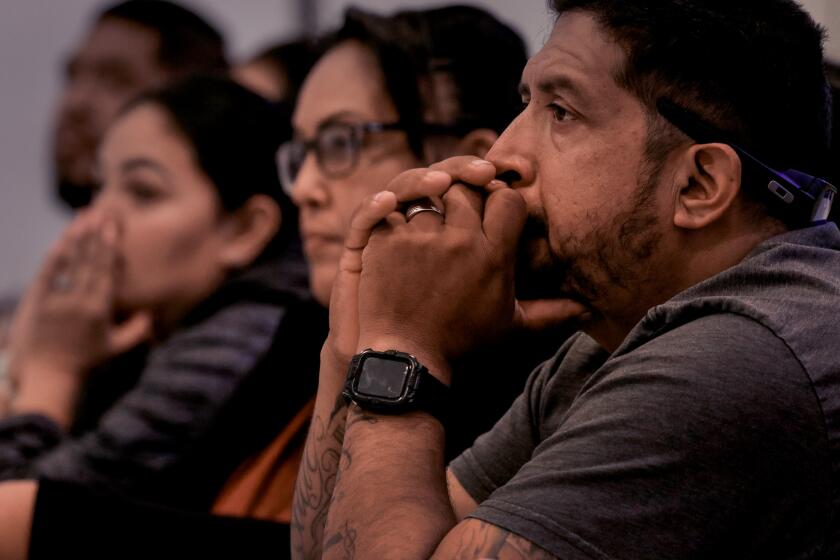Court pushes new asylum seekers to front of the line, challenging them to find lawyers

When the immigration judge asked the husband and wife if they wanted to appeal her decision to terminate the removal proceedings against their child, who recently died, they turned to look at each other. The Lopez family’s confusion showed clearly in their faces, even from behind the masks they wore to protect against the spread of COVID-19.
“Do you understand the question?” Immigration Judge Ana Partida asked from the TV screen on the wall behind the desk where a judge would normally sit in the downtown San Diego courtroom.
“No,” they responded.
Partida explained that she had decided to close their child’s case. As with any decision that she made, she said, the couple could accept the order, and they also had a right to appeal. They still didn’t understand. Lopez, who was clearly grieving the loss of his child, seemed to struggle to focus on the judge’s words as she spoke through a Spanish interpreter.
Because the family didn’t have an attorney to guide them, the act of closing their dead child’s immigration case became a nearly overwhelming ordeal. The family’s country of origin was not clear from the hearing, nor was the reason for the child’s death. The judge recalled that the child had been very sick when the parents last came for a hearing.
The Lopez family, which is not being fully named because of its vulnerable situation as asylum seekers, is among thousands of families around the United States whose immigration cases have been fast-tracked by the Biden administration. The majority of those cases do not have legal representation — a much higher percentage than cases moving at normal speed, according to a recent report from the Transactional Records Access Clearinghouse of Syracuse University.
Called the “dedicated docket,” the immigration court program that the Biden administration implemented in mid-2021 at 11 locations, including San Diego and Los Angeles, prioritizes hearings for cases of recently arrived asylum-seeking families with the goal of finishing those cases within 300 days. This means those cases are heard before older cases in the court’s backlog of more than 1.6 million.
This kind of practice has long been criticized by judges and attorneys for having negative effects on due process as well as the immigration court backlog.
Now that enough time has passed to know the outcomes in some of the cases, advocates are raising concerns about lack of legal representation for families on the special docket and the resulting high rate of deportation orders.
The American Bar Assn. has now implemented a program that it hopes will help address the need for quick access to attorneys.
Past practices
The program is the latest iteration of a long-used strategy intended to deter migration, known as “last-in, first-out.”
Historically, the goal with the last-in, first-out concept is to process the newest cases first, so that people who are rejected from the asylum system are deported and can tell others that it’s not worth it to go because they will be turned back around so quickly. It was used by the Trump and Obama administrations in immigration court, and has also been used on and off for decades with cases filed with the U.S. Citizenship and Immigration Services asylum office.
Breaking News
Get breaking news, investigations, analysis and more signature journalism from the Los Angeles Times in your inbox.
You may occasionally receive promotional content from the Los Angeles Times.
With human rights abuses, corruption and violence around the world causing many to flee their homes, these deterrence efforts have not changed migration trends in a significant way.
“I don’t know why someone would think it would be better to not do cases that are all ready to go,” said former immigration judge Jeff Chase. “I know why — because of the optics. But it doesn’t have a deterrent effect. If people are fleeing for their lives, they’re not going to stop because somebody heard their case faster. It’s just really poorly thought out.”
The Executive Office for Immigration Review, the agency within the Department of Justice responsible for immigration courts, did not respond to questions from the San Diego Union-Tribune for this article.
“The mission of the Department of Justice’s immigration courts is to decide the cases that come before them promptly and fairly,” said Atty. Gen. Merrick Garland in a statement at the time the dedicated docket was announced. “This new program for certain newly arriving families will help achieve that critically important goal.”
The immigration judges union has long argued that shifting docket priorities controlled by the judges’ bosses in the executive branch lead to politicization of the court and exacerbate the backlog.
Former immigration judge Paul Schmidt calls these practices “aimless docket reshuffling.”
“It just creates chaos,” Schmidt said. “That’s why you have these cases that are six, seven, eight years old that never get decided. They’re no priority. They just keep getting recycled to the end of the docket.”
In the past, this type of case reprioritization has caused concerns among attorneys and judges alike that asylum seekers weren’t given enough time to find attorneys or prepare their cases. During the Trump administration, critics referred to the program as the “rocket docket” because many families’ hearings were scheduled so quickly that they didn’t find out in time to show up and were ordered deported in their absence.
Biden’s dedicated docket
On the three days of Biden administration dedicated docket hearings attended by the Union-Tribune, all of the families showed up. For those who were attending their first hearings, they’d been in the United States for about a month. In cases that hadn’t found attorneys, the judge gave the families more time — between a month and a month and a half — to find someone.
With COVID-19 closing courts and postponing hearings, it has been difficult for attorneys to tell if cases have been bumped because of the Biden administration’s dedicated docket or because of the ongoing pandemic. Judges hearing the dedicated docket are generally from courts located inside detention centers, including Otay Mesa Detention Center in San Diego, where Partida sits, and Imperial Regional Detention Facility in Calexico.
What is clear is that, like previous iterations of last-in, first-out in immigration court, families with fast-tracked cases have struggled to find legal representation.
A recent report from the Transactional Records Access Clearinghouse at Syracuse University found that as of the end of December, 15.5% of the cases on the dedicated docket had attorneys.
The report also found that representation seemed to have an effect on outcomes. In the 1,557 cases decided from May through December 2021 in which judges ordered asylum seekers deported, 4.7% had legal representation. In the 13 cases in which judges granted asylum or other means of staying in the United States, all of them had attorneys.
Unlike criminal court, people facing immigration court cases are not given lawyers if they can’t afford to hire one on their own.
Without legal help, understanding the level of proof required to receive asylum — or even procedural decisions, as in the case of the Lopez family — can be overwhelming.
Attorneys also help the cases move more smoothly. Judges have to spend a lot of time answering questions and explaining procedures to asylum seekers representing themselves — time that could be spent on other cases.
For newly arrived families, early months in the United States are often spent trying to survive without being allowed to work and learning to navigate unfamiliar U.S. bureaucracy, such as school enrollment for their children. They generally live with sponsors — friends, family or other U.S. residents willing to house them — and often don’t have the money to pay lawyers to take their cases.
Lawyers needed
The American Bar Assn. last month started a program to try to help with the situation by pairing families on the dedicated docket with pro bono attorneys. The project has a website where interested attorneys can review cases looking for legal aid.
“Immigration relief is complex, and having to proceed through the process without representation is really difficult,” Adonia Simpson said, noting that many studies have shown legal representation has a significant effect on case outcomes. “Attorneys are able to make a difference in the lives of so many families, whether it’s asylum or some other immigration benefit.”
The project offers training to lawyers wanting to get involved. They don’t need to have backgrounds in immigration law, Simpson said. She hopes that the expedited nature of the docket will encourage attorneys to step up since the cases are supposed to happen much faster than the average asylum case.
At the San Diego court, attorneys with the ABA’s Immigration Justice Project offer consultations at a help desk they set up in a spare room. If a family from the dedicated docket wants help finding a lawyer, they place the family on the website’s database.
On a recent morning when four Haitian families met with Partida for the first time, she encouraged them all to make a significant effort to find lawyers.
“I must caution you that immigration law can be very complicated at times,” Partida said.
One man told Partida that he’d tried calling the court’s list of free immigration attorneys, but they didn’t answer.
“I don’t have money to get an attorney,” he told the judge through a Creole interpreter.
She told him to keep trying.
Every family stopped in the project’s office after court.
More to Read
Sign up for Essential California
The most important California stories and recommendations in your inbox every morning.
You may occasionally receive promotional content from the Los Angeles Times.











